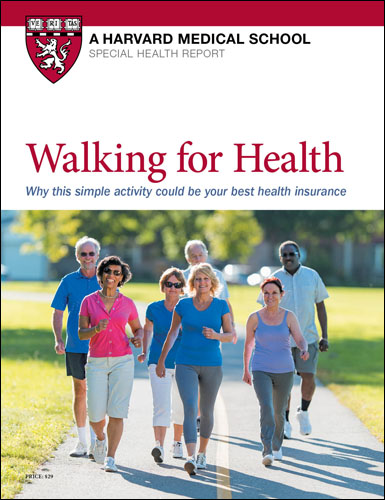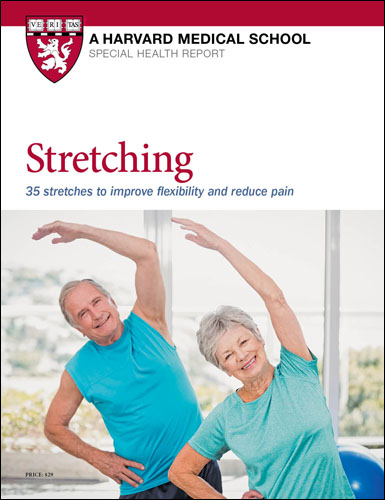
5 timeless habits for better health

What are the symptoms of prostate cancer?

Is your breakfast cereal healthy?

When pain signals an emergency: Symptoms you should never ignore

Does exercise give you energy?

Acupuncture for pain relief: How it works and what to expect

How to avoid jet lag: Tips for staying alert when you travel

Biofeedback therapy: How it works and how it can help relieve pain

Best vitamins and minerals for energy

Should you take probiotics with antibiotics?


Walking for Health: Why this simple activity could be your best health insurance
The simple activity of walking has so many powerful health benefits. Done correctly, it can be the key to losing weight, lowering blood pressure and cholesterol, and boosting your memory, as well as reducing your risk for heart disease, diabetes, cancer, and more. Walking for Health, created by the experts at Harvard Medical School, takes you step by step from why walking may be the most perfect exercise, to how to get started on a walking program, to specific walking workouts. It even has a special section on walking for weight loss.
Other Product Information
The next time you have a medical check-up, don’t be surprised if your doctor hands you a prescription to walk. Yes, this simple activity that you’ve been doing since you were about a year old is now being touted (along with other forms of regular physical activity) as “the closest thing we have to a wonder drug,” in the words of Dr. Thomas Frieden, director of the Centers for Disease Control and Prevention. Judging from the research, it’s a well-earned reputation.
Walking can have a bigger impact on disease risk and various health conditions than just about any other remedy that’s readily available to you. What’s more, it’s free and has practically no negative side effects.
Walking for 2.5 hours a week — that’s just 21 minutes a day — can cut your risk of heart disease by 30%. In addition, this do-anywhere, no-equipment-required activity has also been shown to reduce the risk of diabetes and cancer, lower blood pressure and cholesterol, and keep you mentally sharp. In fact, according to some estimates, walking regularly could save Americans over $100 billion a year in health care costs. Even a quick one-minute jaunt pays off. A University of Utah study in 2014 found that for every minute of brisk walking that women did throughout the day, they lowered their risk of obesity by 5%. No more “I don’t have time” excuses!
Start walking, and you’ll be helping to make your community stronger, too. Social scientists have found that as more people take to the streets, neighborhood crime rates fall and the local economy improves. It’s also a wonderful way to meet new people and connect with neighbors. Take a walk with your children after dinner. It can promote better communication, reduce behavior problems, and improve academic performance.
Walking can even help your mood. A number of studies have found that it’s as effective as drugs for decreasing depression. It can help relieve everyday stresses, too. Tension starts to ease as the road stretches out in front of you. Mood-elevating endorphin levels increase. Many people find that walking helps clear the mind, too — you may even find the solution to a problem that’s been bugging you.
So don’t wait for your next doctor’s appointment to get inspired. Put on your shoes, step out the door, and rediscover the joys of walking.
This Special Health Report was prepared by the editors of Harvard Health Publishing in consultation with Medical Editor Lauren E. Elson, M.D., Physical Medicine and Rehabilitation Instructor at Harvard Medical School, along with Fitness Consultant Michele Stanten, Certified Fitness Instructor, American Council on Exercise. 53 pages. (2019)
- Walking: An ideal form of exercise
- It’s easy
- It’s healthy
- It’s fun
- Should you check with your doctor first?
- Advice for people with heart conditions
- Advice for people with diabetes
- Advice for people with arthritis
- Advice for people with COPD
- First steps: Starting a walking program
- Where to walk
- Types of walking
- How much is enough?
- Technique
- Essential gear
- Avoiding injuries
- Safety tips
- Walking workouts and more
- Walking warm-up
- Easy walking workout
- Interval walking workouts
- Walking workout with a resistance band
- Nordic walking workout
- Mindful walking workout
- Post-walk stretches
- Strength training for walkers
- Walking through the seasons
- Walking in the winter
- Walking in the summer
- Dress for success
- Walking for weight loss
- Go faster
- Climb hills
- Grab some poles
- Take the stairs
- Going the distance: Staying motivated
- Get support
- Use a pedometer
- Try apps to keep you motivated
- Sign up for an event
- Be kind to yourself
- Resources
You might also be interested in…

Stretching: 35 exercises to improve flexibility and reduce pain
Stretching is an excellent thing you can do for your health. These simple, yet effective moves can help you limber up for sports, improve your balance and prevent falls, increase your flexibility, and even help relieve arthritis, back, and knee pain. Whether you're an armchair athlete or a sports enthusiast, this Special Health Report, Stretching: 35 exercises to improve flexibility and reduce pain, from the experts at Harvard Medical School will show you how to create effective stretching routines that meet your needs and ability.

5 timeless habits for better health

What are the symptoms of prostate cancer?

Is your breakfast cereal healthy?

When pain signals an emergency: Symptoms you should never ignore

Does exercise give you energy?

Acupuncture for pain relief: How it works and what to expect

How to avoid jet lag: Tips for staying alert when you travel

Biofeedback therapy: How it works and how it can help relieve pain

Best vitamins and minerals for energy

Should you take probiotics with antibiotics?
Free Healthbeat Signup
Get the latest in health news delivered to your inbox!
Sign Up